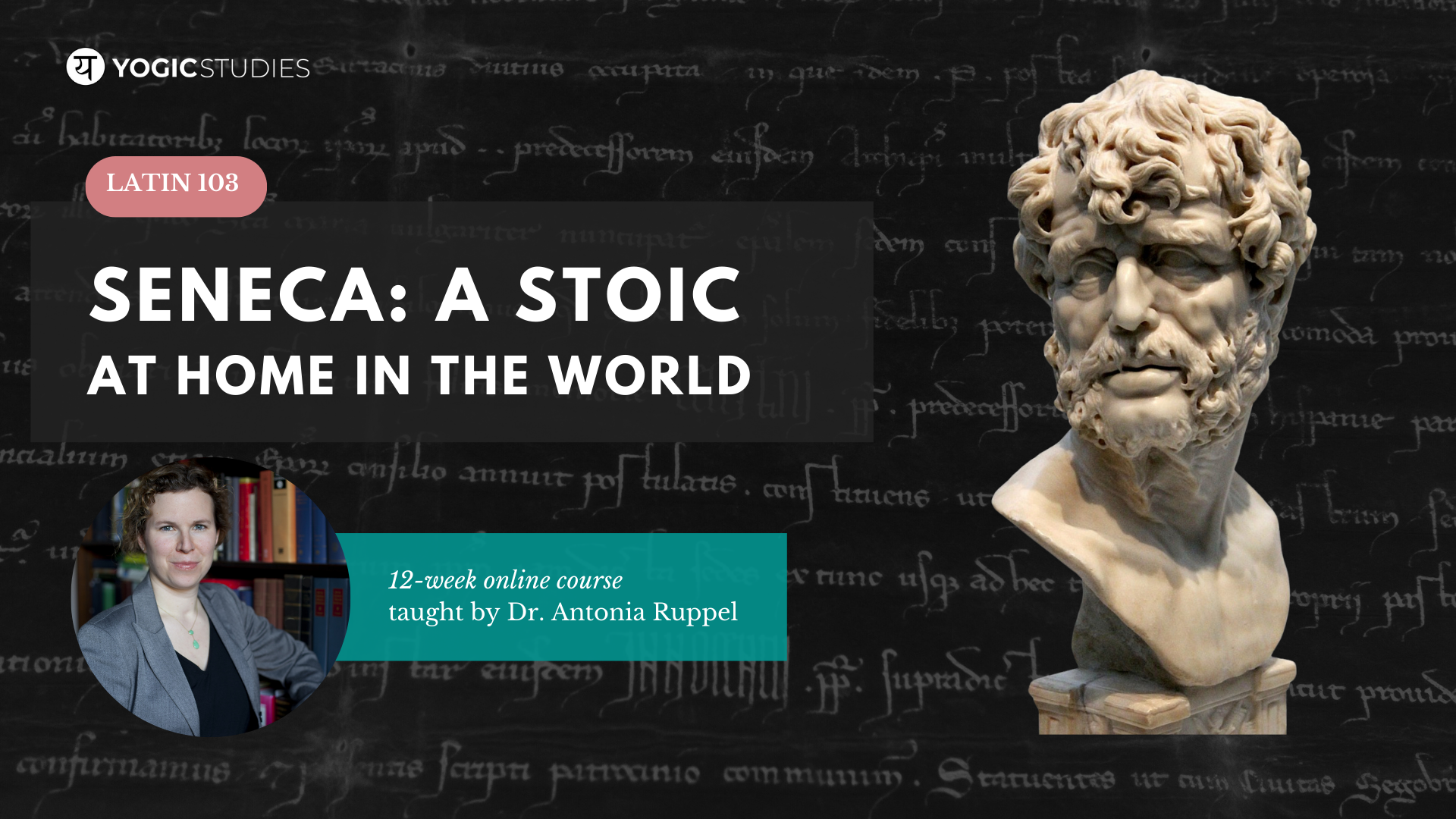
Course Description
This class is a continuation of LATIN-S 101 | Latin for Sanskritists, an intensive introduction to Latin aimed at students with prior knowledge of (grammatically greatly parallel) Sanskrit, and LATIN 102 | The Writings of Ovid.
Lucius Annaeus Seneca the Younger, usually known as Seneca, had quite the life. Born in the city of Córdoba in Spain a little over 2,000 years ago, he moved to Rome for his education, spent ten years in Egypt to get over the tuberculosis that had aggravated his asthma, went back to Rome to embark on a successful political career, is exiled to Corsica under trumped-up charges by the new Emperor Claudius, is recalled to Rome to become tutor of Nero (Claudius’ adoptive son and future Emperor), is credited with positive influence on Nero during his early reign, loses influence over time as Nero, apparently, increasingly loses his mind, and is eventually ordered by Nero to take his own life. He quickly finishes the writings he’s been working on, and, as ordered, slits his own wrists.
Such is the life of a highly intelligent man, living close to the centre of power, in the autocracy that was the Roman Empire. Already as part of his early education, Seneca had encountered Stoicism, a philosophical system that originated in Greece three centuries earlier and that aimed at thinking, compassionate self-control. The Stoic who understands him- or herself, or so the goal was, would be able to live a fulfilled, contented life even in difficult times.
Whenever he had time – in exile, in the semi-retirement of his last years – or when he had occasion – for example after a particularly fraught act or decision of Nero’s – Seneca would put Stoic thought to paper. His philosophical works include essays On Clemency, On Anger, On the Shortness of Life, On the Tranquillity of the Mind, and a collection of ‘letters’ in which he writes to his fictitious friend Lucilius about a large variety of everyday questions, looked at from a Stoic perspective. Friends, health, worry about old age or death, material needs, the need for quiet, hope and its relationship to fear, good company, what is the supreme good, going on holiday, virtue: name something that occupies our thoughts, and be assured that Seneca has given Lucilius his thoughts about it, and that he has rounded them off with good quote or two from a solid Stoic authority.
Our course will focus on Seneca’s Moral Letters to Lucilius. And yes, that means we will only be reading a tiny part that cruelly underrepresents Seneca’s varied literary works. (He wrote tragedies as well, an extended work on physics (Naturales Quaestiones) and for good measure also a satire, the famous Apocolocynthosis or Pumpkinification of the Emperor Claudius.) Yet the goal of this course is to put you in a position where, with the help of freely available resources, you will be able to read any of Seneca’s writings in the original all on your own.
Our textbook will be A Stoic at Home in the World – Selections from Seneca’s Letters to Lucilius, written by the instructor herself.

Course Structure
-
Two 90-minute live lessons will be held per week on Zoom.
- Tuesdays and Thursdays 11am-12:30pm Pacific Time
- All live sessions will take place via Zoom and will be recorded for later viewing.
-
Live sessions will address all student questions, go over exercises and readings together, as well as personalize the learning experience with your instructor.
-
Weekly written homework, quizzes to test yourself, as well as a mid-term and a final.
Students Will Receive:
- 24 Zoom live class sessions + recordings (90 min)
- Yogic Studies Certificate upon completion (PDF)
- Access to the private Community Forum
Dr. Antonia M. Ruppel
Lecturer in Sanskrit, Greek, and Latin
Antonia Ruppel is a Classicist by training who came to Sanskrit through a series of fortunate accidents. She learnt the language as an autodidact, and one of her reasons for writing her textbook, The Cambridge Introduction to Sanskrit (2017), was to make the experience of studying Sanskrit easier and more pleasant for others. In 2021, she published the follow-up volume, An Introductory Sanskrit Reader: Improving Reading Fluency, designed to help students gain reading fluency in an enjoyable and straightforward way.
Language pedagogy is at the heart of her life. She has been teaching Sanskrit for almost 20 years at universities such as Cornell, Oxford and the LMU in Munich, Germany, as well as offering courses in variety of formats online.
Listen to our interview with Dr. Ruppel on the Yogic Studies Podcast.
Enrollment is currently closed.
Regular Tuition
$375
One-Time Payment
Regular Tuition
$125
Three Monthly Payments
Stay Informed
Sign up for the Yogic Studies mailing list to find out first about upcoming courses, podcast episodes, promotions, events, and the latest research delivered straight to your inbox.


